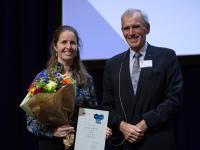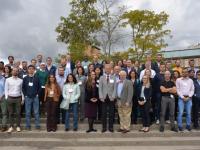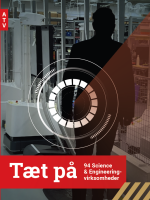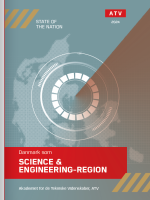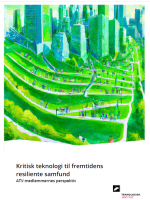Torkil Holm Symposium: Visions in Chemistry 2022
Eleven influential and distinguished chemists will come to Copenhagen on Jan. 28-29, 2022 for the internationally recognized biennial Torkil Holm Symposium: Visions in Chemistry
The aim of the Torkil Holm Symposium is to bring together world-leading experts from both academia and industry to present a broad range of topics within the field of chemical science.
The symposium will include presentations on organic synthesis, catalysis, materials science, sustainable chemistry, and chemistry at the interface to biology by the following world-class scientists, in first-name alphabetical order:
-
Professor
Belén Martin-Matute,
University of Stockholm
- Biography:
Professor in organometallic chemistry at Organic Chemistry at SU, leads activities on the development of new catalytic processes to produce carbon-carbon and carbon-heteroatom bonds. This includes converting water, carbon dioxide, and other renewable resources into chemical products without having to deal with hazardous intermediates. Heteroatoms, such as oxygen, nitrogen and halogens are common in pharmaceuticals and agricultural chemicals. To make these bonds selectively is one of her main interests. In her research, Belén Martín-Matute uses a variety of metal catalysts, as well as metal-free ones (so-called organocatalysts). By refining the electronic and steric properties of catalysts, activity and selectivity can be controlled. A very important aspect of her work deals with the synthesis of heterogeneous catalysts based on porous metal-organic frameworks (MOFs). In Belén Martín-Matute's research, sustainability is also prioritized by using environmentally friendly solvents and versatile, stable and structurally simple but yet effective catalysts. Martín-Matute was promoted to Professor in 2014 at Stockholm University, where she continues her activities. She received the Young Investigator Award from the Spanish Royal Society of Chemistry / Sigma Aldrich in 2007, the Lindbomska Award from the Swedish Academy of Sciences in 2013, and the Göran Gustafsson (GG) Award by the GG Foundation. She currently serves as advisory board member for ACS Sustainable Chemistry & Engineering and she is soon joining as advisory board member for Chemistry- An European Journal. Since November 2021, she is an associate editor for Organic Letters.
-
Chair Professor
Ben Zhong Tang,
Hong Kong University of Science
-
Biography:
Ben Zhong Tang is Stephen K. C. Cheong Professor of Science, Chair Professor of Chemistry, and Chair Professor of Chemical and Biological Engineering at The Hong Kong University of Science and Technology (HKUST). His research interests include macromolecular chemistry, materials science and biomedical theranostics. Tang received B.S. and Ph.D. degrees from South China University of Technology and Kyoto University, respectively. He conducted postdoctoral research at University of Toronto. He joined HKUST as an assistant professor in 1994 and was promoted to chair professor in 2008. He was elected to the Chinese Academy of Sciences and the Royal Society of Chemistry (RSC) in 2009 and 2013, respectively. Tang has published >1,400 papers. His publications have been cited >97,000 times with an h-index of 144. He has been listed by Thomson Reuters as a Highly Cited Researcher in both areas of Chemistry and Materials Science. He received the State Natural Science Award (1st Class; 2017) from Chinese Government, Scientific and Technological Progress Award from the Ho Leung Ho Lee Foundation (2017) and Senior Research Fellowship from the Croucher Foundation (2007). He is now serving as Editor-in-Chief of Materials Chemistry Frontiers (RSC & CCS). -
Professor
Floyd Romesberg,
Sanofi, CA
-
Biography:
Floyd E. Romesberg received a BS in chemistry from The Ohio State University, and a PhD in physical organic chemistry from Cornell University. From 1998 to 2019 he was a faculty member in the Chemistry Department at The Scripps Research Institute, where he led a research laboratory that applied organic chemistry, microbiology, non-linear optical spectroscopy, and genetics, to study different aspects of evolution. Of particular significance is his work to expand the genetic alphabet and code through the development of a third DNA base pair that relies on hydrophobicity as opposed to hydrogen bonding for selective pairing. Romesberg is the recipient of the Camille Dreyfus Teacher Scholar Award, the NSF CAREER Award, the Discover Magazine Technology Innovation Award, the ACS Nobel Laureate Signature Award, and the Royal Society of Chemistry’s Bioorganic Chemistry Award. His research was funded by the National Institutes of Health, National Science Foundation, Office of Naval Research, and Defense Advanced Research Projects Agency. Romesberg has been elected to the National Academy of Inventors and is the scientific founder of the biotech companies Achaogen, Inc. and RQx Inc., as well as Synthorx, Inc, which was acquired by Sanofi and where he is currently a Scientific Fellow working to use the expanded genetic alphabet to create novel therapeutics. -
Professor
Frank Glorius,
Westfälische Wilhelms Universität Münster
-
Biography:
Frank Glorius is a full professor of organic chemistry at the Westfälische Wilhelms-Universität Münster. He received his PhD for work with Andreas Pfaltz from the University of Basel in 2000, followed by a postdoctoral stay at Harvard University with Dave Evans. His diverse research program focuses on the development of new concepts for diverse areas of catalysis such as photocatalysis, C–H activation, data science and machine learning, N-heterocyclic carbenes (NHCs) in organocatalysis and as surface modifiers and in (asymmetric) arene hydrogenation. In addition, molecules are designed and synthesized for applications in biological systems (membrane analogues, drugs) and material science (semiconductors, battery additives, heterogeneous catalysts). -
Professor
Hiroaki Suga,
University of Tokyo
-
Biography:
Hiroaki Suga is a Professor of the Department of Chemistry, Graduate School of Science in the University of Tokyo. He received PhD at MIT (1994) followed by post-doctoral fellow in MGH (1997). He was Assistant and tenured Associate Professor in the State University of New York at Buffalo (1997-2003) and Professor in the Research Center for Advanced Science and Technology in the University of Tokyo (2003-2010). Since 2010, he has the present position. He is the recipient of Akabori Memorial Award 2014, Max-Bergmann Medal 2016, Nagoya Medal Silver 2017, Vincent du Vigneaud Award 2019, Bohlmann Lecture 2019, MIT T.Y. Shen Lecture 2020, and ETHZ Prelog Lecture 2020. He is also a founder of PeptiDream and MiraBiologics in Japan. -
Professor
Karl Anker Jørgensen,
Aarhus University
-
Karl Anker Jørgensen
Biography:
1955 Born, Aarhus, Denmark, June 15.
1975 Student at Aarhus University (chemistry and physics).
1979/80 Sabbatical due to sports activities.
1984 PhD in a combination of organic and theoretical chemistry.
1985 Post.doc. with Professor Roald Hoffmann, Cornell University, USA.
1985 Assistant Professor at Aarhus University.
1989 Associate Professor at Aarhus University; Doctor of Science.
1992 Research Professor – Minister appointed.
1993 Professor at Aarhus University.
1994 Member of the Royal Danish Academy of Sciences and Letters.
1995 Awarded the Bjerrum Medal.
1997 The Danish National Research Foundation Grant.
1999 Member of Danish Academy of Technical Sciences.
2000 Awarded The Villum Kann Rasmussen Award.
Awarded The Lundbeck Foundation Nordic Research Prize.
2002 The Danish National Research Foundation Grant.
2003 Awarded The Blomquist Award (USA).
2004 Awarded Commander of the Order of Rubén Darío (Nicaragua).
Awarded Knight’s Cross of the Order of the Dannebrog.
2005 Fellow of the Royal Society of Chemistry (UK).
Awarded the Carlsberg Chemistry Prize.
2012 Awarded Ib Henriksens Research Prize.
2016 Member of The Royal Swedish Academy of Sciences.
Awarded The Rigmor and Carl Holst-Knudsen Science Prize.
Awarded Knight’s Cross 1st Class of the Order of the Dannebrog.
2017 Awarded The Carlsberg Foundation Research Prize.
2019 Awarded Villum Investigator and a grant of 40 mio. D.Kr.
Awarded The H. C. Ørsted Medal in Gold.
2020 Awarded The Maria Skłodowska-Curie Medal (awarded 2021 due to COVID-19).
Awarded Chemistry European Fellow (award ceremony postponed to 2022 due to COVID-19).
Publications:
Ca. 460 scientific papers in international refereed journals; h-index: 106, citations: ca. 41,000.
- Professor Kristian Strømgaard, University of Copenhagen
-
Kristian Strømgaard obtained an MSc degree in Chemical Research from University College London, and continued as a PhD student in medicinal chemistry, part-time at H. Lundbeck. He did a post doc at Columbia University (New York), and shortly after, he was appointed H. Lundbeck Professor at the age of 36 to establish research in Chemical Biology. He won the ‘Teacher of the Year’ award from the Faculty of Pharmaceutical Science (Univ. Cph.) in 2009. In 2012, he co-founded Avilex Pharma, where he has taken the lead compound into clinical development. In 2014, he was appointed Director of Center for Biopharmaceuticals, where he has headed a research center on peptide and protein engineering. Recently, he was visiting professor at Harvard Medical School (Boston) to explore medical research and innovation. In 2021 he was awarded the 2021 University of Copenhagen Innovation Award and appointed Novo Nordisk Foundation Distinguished Innovator.
-
Professor
Lee Cronin,
University of Glasgow
-
Biography:
Leroy (Lee) Cronin FRSE is the Regius Professor of Chemistry in Glasgow. Since the age of 9 Lee has wanted to explore chemistry using electronics to control matter, understand the origin of life, and generally confuse people with ideas that may or may not make sense one day. He strives to use his imagination to create new ideas that might tell us something about the universe, after all, the imagination is housed in a chemical brain and thus does exist. His research has four main aims 1) the construction of an artificial life form / work out how inorganic chemistry transitioned to biology / searching for new life forms; 2) the digitization of chemistry; and 3) the use of artificial intelligence in chemistry including the construction of ‘wet’ chemical computers; 4) The exploration of complexity and information in chemistry. He runs a team of around 60 people funded by grants from the UK EPSRC, US DARPA, Templeton, Google, BAe, JM. Finally, Lee likes to run a transparent and progressive group. Lee does not like hierarchy but likes organisation and well-defined actions. He likes to mentor researchers using a problem-based approach to solving big ideas. Nothing is impossible until it is tried. See www.croninlab.com -
Professor
Ryan Shenvi,
Scripps, San Diego, California
-
Biography:
Professor Ryan A. Shenvi graduated with distinction in chemistry from Penn State University as a Schreyer’s Scholar. He earned his PhD with Phil Baran as an NDSEG Fellow and undertook postdoctoral studies with EJ Corey as a Ruth Kirschstein Fellow at Harvard University. Ryan began his independent career at Scripps Research in 2010 and was tenured in 2014. Recent honors include the Blavatnik Award, Tetrahedron Young Investigator Award and SSOC Japan Lectureship Award. His group develops new chemistry to navigate and interrogate natural product chemical space. -
Director, Ph.D.
Shalini Andersson,
Astra Zeneca, Göteborg
-
Biography:
Shalini Andersson is Chief Scientist New Therapeutic Modalities and Head of Oligonucleotide Discovery in Discovery Sciences, BioPharmaceuticals R&D. She is also a member of the Management Team for Discovery Sciences as well as of the Review Board for drug projects in all therapy areas in BioPharmaceuticals R&D.
Currently Shalini is also leading Targeted Drug Delivery within Cardiovascular, Renal and metabolic diseases and several collaborations with academic research groups and biotechs in the nucleic therapeutics field.
Shalini received her PhD in 1989 at the University of Linköping, Sweden. Prior to joining AstraZeneca in 1997, she was Associate Professor in Organic and Analytical Chemistry at the University of Linköping, Sweden. She is the author or co-author of over 40 peer reviewed articles, 2 book chapters and 5 patents.
Shalini is member of the Board of Oligonucleotide Therapeutics Society and of the Scientific Advisory Group for Nucleic Acid Therapy Accelerator (UK). -
Professor
Tanja Weil,
Max Planck Institut, Mainz
-
Biography:
Prof. Dr. Tanja Weil joined the Max Planck Society in 2017 as one of the directors of the Max Planck Institute for Polymer Research, heading the division “Synthesis of Macromolecules”. She studied chemistry (1993–1998) at the TU Braunschweig (Germany) and the University of Bordeaux I (France) and completed her PhD at the MPI for Polymer Research under the supervision of K. Müllen. In 2003, she received the Otto Hahn Medal of the Max Planck Society. From 2002 to 2008 she managed different leading positions at Merz Pharmaceuticals GmbH (Frankfurt) from Section Head Medicinal Chemistry to Director of Chemical Research and Development. In 2008 she accepted an Associate Professor position at the National University of Singapore. Tanja Weil joined Ulm University as Director of the Institute of Organic Chemistry III / Macromolecular Chemistry in 2010. She has received numerous competitive funding at both national and international level including a Synergy Grant of the European Research Council (ERC). She serves in many advisory boards and steering committees: she is a member of the senate of the German Research Foundation, a member of the senate of the Leibniz Association and of the Leibniz evaluation panel. Tanja is an associate editor for JACS and a member of the editorial advisory board of ACS Nano. Her scientific interests focus on innovative synthesis concepts to achieve functional macromolecules and hybrid materials to solve current challenges in biomedicine and material science.
And a lecture by the winner of the Torkil Holm Prize for 2022.
Following a year and a half of varying degrees of limits to gathering in large numbers, it is with special pleasure that we underline that the symposium provides an excellent environment for networking with some of the best in the chemistry field. This is furthermore promoted by scientific and social gatherings during appropriate breaks for discussion, including seated lunch breaks and a symposium dinner.
The conference is open to all and you are welcome to forward this invitation to others who might wish to participate.
Registration is closed
Conference fee:
DKK 1000 for students including PhD students, DKK 3850 for full rate participants.
Participants from other countries than Denmark will have the VAT subtracted from their invoice.
Please note:
it is not possible to pay by card. Our invoicing process will begin in November.

